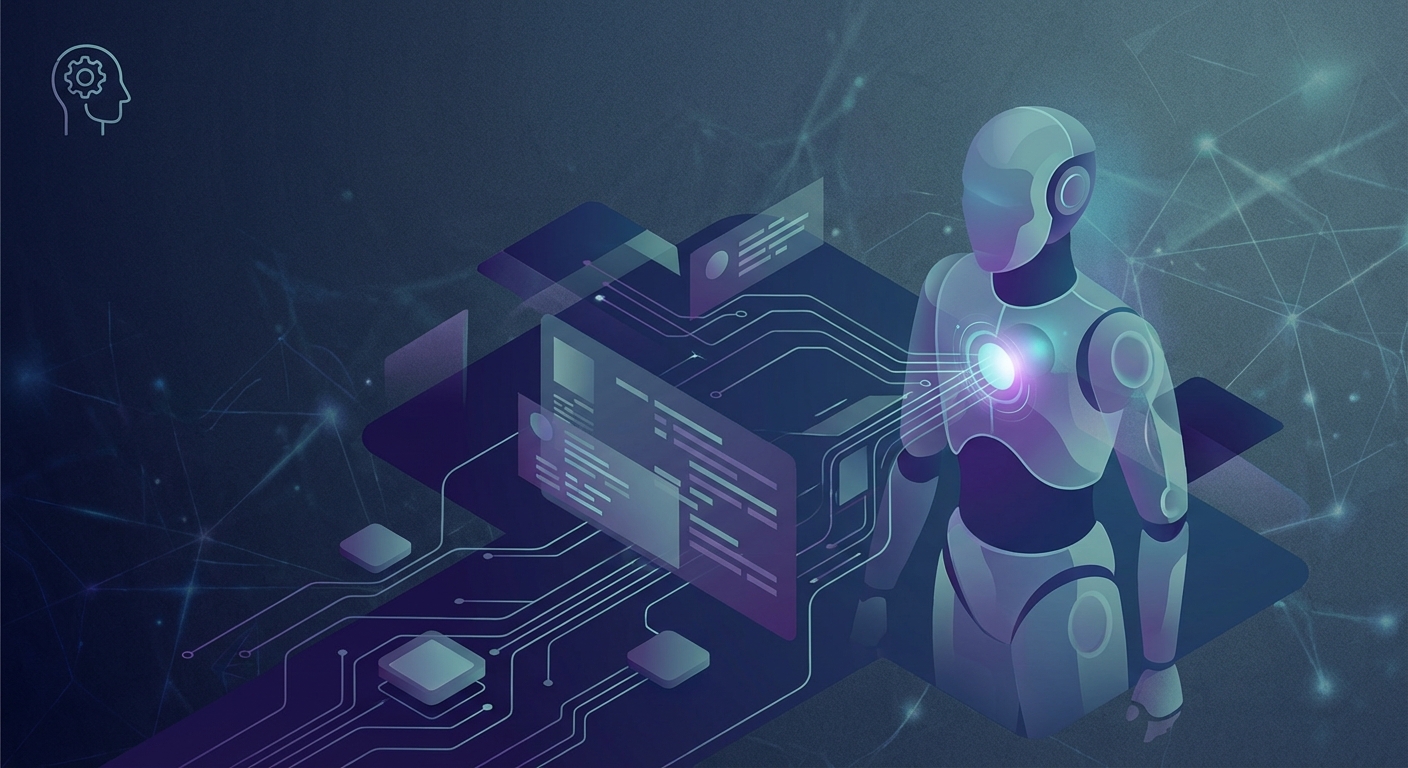Understanding Commonsense Reasoning and Knowledge in AI
TL;DR
- This article covers the fundamentals of commonsense reasoning and knowledge in ai, exploring its importance in creating truly intelligent systems. It details successful approaches like taxonomic and temporal reasoning, and will guide you through the challenges, including knowledge acquisition and abstraction. You'll discover techniques like web mining and crowdsourcing, along with a look at future trends and benchmarks for this crucial field.
The Growing Importance of AI Development Services
Alright, let's dive into why ai development services is becoming such a big deal. It's not just hype; it's a real shift, kinda like when everyone suddenly needed a smartphone.
It's not just some futuristic thing anymore. ai is here, and it's changing how industries work, period.
- ai is no longer a future concept; it's a present-day reality transforming industries. Think about it: in healthcare, ai's helping doctors diagnose diseases faster and with more accuracy. In retail, it's personalizing shopping experiences. It's even impacting farming with precision agriculture, optimizing crop yields.
- Businesses are realizing the potential of ai to automate tasks, gain insights, and improve decision-making. Companies are seeing that ai can handle routine stuff, freeing up employees to focus on more creative and strategic work. Plus, ai can crunch data to reveal trends and patterns that humans might miss, leading to better choices.
- The demand for ai development services is rapidly increasing as more companies seek to leverage ai. More and more businesses are trying to get in on the ai action, but they often lack the in-house expertise to do it themselves. That's where ai development services come in.
- Early adoption of ai is becoming a competitive advantage. Getting in on the ai game early can give companies a leg up on their competition. According to a report by Bitcot.com, 73% of businesses plan to integrate ai solutions by 2025. Those who wait risk falling behind.
Implementing ai isn't exactly a walk in the park. It's complex and requires specialized expertise.
- AI implementation is complex and requires specialized expertise. Let's just be real, ai isn't plug-and-play. It needs people who know their stuff when it comes to machine learning, data science, and related fields.
- Most companies lack the in-house skills to develop and deploy ai solutions effectively. Most businesses simply don't have the people on staff who can build and deploy ai solutions from scratch. It's a whole different ballgame than traditional software development.
- AI development services provide access to experienced AI professionals and cutting-edge technologies. By hiring outside help, companies can tap into a pool of ai experts and access the latest tools and techniques.
- Using specialized services ensures high-quality AI solutions tailored to specific business needs. These services can create custom ai solutions that are perfectly suited to a company's unique challenges and goals.
Investing in ai development isn't just about keeping up with the Joneses; it can actually boost your bottom line.
- AI can drive significant cost savings by automating tasks and optimizing processes. ai can automate repetitive tasks, like data entry and customer service, freeing up employees to focus on more important things.
- AI can improve revenue generation by enhancing customer experiences and enabling personalized marketing. ai can help businesses better understand their customers and deliver more personalized experiences, leading to increased sales and loyalty.
- AI can provide valuable insights that lead to better strategic decisions. ai can analyze vast amounts of data to reveal trends and patterns that humans might miss, leading to better informed decisions.
- Investing in AI development services can result in a substantial return on investment for businesses. According to Rapidinnovation.io, companies that adopt ai can expect a 20-30% increase in cash flow by 2030.
So, yeah ai development services are becoming increasingly important for businesses that want to stay competitive and drive growth.
Next up, we'll explore the diverse applications of ai across different industries.
Key AI Development Services to Consider
Alright, so you're thinking about jumping into the ai game? Good move! But where do you even start? It's not just slapping some code together, it's about figuring out what kind of AI capabilities you actually need.
So, let’s break down some key ai development services you’ll probably want to consider.
Think of this as your ai tailored suit. You know, off-the-rack stuff can work, but nothing beats something made just for you. These services are all about building ai applications that fit your business like a glove.
- Tailored ai applications designed to meet specific business requirements. Forget generic solutions! This is about getting ai that solves your unique problems. Imagine a hospital needing to predict patient readmissions. A custom ai solution could analyze patient data to identify at-risk individuals, leading to targeted interventions and reduced readmission rates.
- Development of machine learning models for predictive analytics and automation. This is where ai gets its crystal ball. Machine learning models can forecast trends, automate decisions, and optimize processes. For example, a supply chain company could use machine learning to predict demand fluctuations and optimize inventory levels, cutting costs and improving efficiency.
- Creation of natural language processing (nlp) systems for chatbots and sentiment analysis. Ever wonder how chatbots seem to "understand" you? nlp is the secret sauce. It allows ai to process and interpret human language. A retail company could use nlp to analyze customer reviews and identify common pain points, enabling them to improve their products and services.
- Building computer vision solutions for image recognition and object detection. This is ai's ability to "see". Computer vision can identify objects, analyze images, and even detect anomalies. A manufacturing plant could use computer vision to inspect products for defects, ensuring quality and reducing waste.
Okay, so you've got your fancy ai solution. Now what? You can't just let it sit there! This service is all about getting your ai to play nice with your existing systems.
- Integrating ai capabilities into existing business systems and workflows. This is where the real magic happens. You want your ai to be part of your daily operations, not some separate side project. Imagine a sales team using ai to analyze customer data within their crm system, giving them insights to close deals faster.
- Connecting ai models with crm, erp, and other enterprise applications. Think of it as building bridges between your ai brain and the rest of your company. As sumatosoft.com notes, integrating ai models with existing systems, like salesforce or sap, is a challenge for enterprises.
- Ensuring seamless data flow and interoperability between ai and legacy systems. You don't want your ai to be stuck in its own little silo. It needs to be able to access and process data from all your systems, old and new.
Feeling a bit lost in the ai jungle? These services are your guide. They'll help you figure out where ai fits into your business and how to make it work for you.
- Providing expert guidance on ai adoption and implementation. Think of it as having an ai sherpa. They'll help you navigate the complex landscape and choose the right path for your business.
- Developing ai strategies aligned with business goals. It's not just about using ai for the sake of it. It's about using ai to achieve specific, measurable goals.
- Assessing ai readiness and identifying opportunities for ai applications. Are you ready for ai? Where can it make the biggest impact? These consultants will help you answer those questions.
- Offering ai roadmap development and technology selection assistance. They'll help you create a plan for your ai journey and choose the right tools for the job.
So, as you're thinking about adding ai, remember these services. They're not just buzzwords; they're the building blocks of a successful ai implementation. Next up, we'll dive into how ai is actually being used in different industries – real-world examples, not just theory.
Choosing the Right AI Development Partner
Okay, so you've got all this ai stuff you could be doing. But how do you pick the right team to help you do it? It's kinda like finding a good mechanic – you want someone who knows their stuff, but also someone you can actually talk to.
First off, dig into their technical chops. Do they really know their ai? Can they talk intelligently about stuff like machine learning and deep learning? Don't just take their word for it, look at their prior work.
- Expertise in Relevant AI Technologies: You need to know if they actually understand the ai tools they're using. Are they up to speed on the latest advancements? For instance, if you're in the healthcare industry, do they have experience with ai tools used in diagnostics or patient care?
- Portfolio Review: Look at their past ai projects. What kind of problems have they solved? Can they show you real results - not just buzzwords? Did they actually complete the projects successfully?
- Certifications and Partnerships: Check if they have certifications from major ai vendors. Do they partner with companies like nvidia or google? This can be a good sign, though it's not the only thing that matters.
- Understanding AI Concepts: Do they really understand machine learning, deep learning, and all those other ai concepts? Can they explain it to you in a way that makes sense, or do they just throw around jargon?
Tech skills are important but, that partner also needs to get your business. You wouldn't hire a plumber to rewire your house, right? Same deal here.
- Industry Experience: Do they have experience in your specific industry? Healthcare ai is very different from retail ai. You want someone who understands the unique challenges and opportunities in your field.
- Understanding Your Business Goals: Do they get what you're trying to achieve? It's not just about building cool ai – it's about solving real business problems, and as Rytsensetech.com notes, it is important to align the client to its business needs and goals.
- Translating AI into Business Outcomes: Can they show you how their ai solutions will actually impact your bottom line? It's gotta be more than just "it'll be more efficient" – you need to see real, tangible results.
- Knowledge of Regulations: Are they aware of the regulatory landscape in your industry? Especially if you're working with sensitive data, like in healthcare or finance.
Okay, you've found a partner who seems to know their stuff and understands your business. Let's make sure you can actually work with them.
AI Development: Navigating Challenges and Risks
Okay, so you're building out your ai dream, but it's not all sunshine and rainbows, right? You're bound to hit some snags—trust me, it happens.
One of the biggest stumbling blocks is data quality. I mean, ai is only as good as the data you feed it. If your data is a mess – incomplete, inconsistent, or just plain wrong – your ai models are gonna spit out garbage. Imagine trying to teach ai to predict customer churn using a dataset where half the customer addresses are missing, or the sales figures are all over the place. This will significantly hinder the AI's ability to perform accurately. Plus, not having enough data can also kill your ai dreams. ai algorithms need a whole lotta examples to learn effectively.
Then there's the whole minefield of ethics and bias. ai models can accidentally learn and repeat biases that exist in the data they're trained on. Think about it: if you're using ai to screen job applications, and your training data is based on historical hiring decisions that favored one group over another, your ai is going to perpetuate that bias. It's not just about being fair; it's about building trust in your ai systems. Nobody wants an ai that's discriminatory or unfair.
Integration with existing systems presents significant challenges. Trying to get ai to play nice with your existing systems can be a total headache. Legacy systems, incompatible architectures, data silos it's a recipe for disaster. Plus, if you rush things and build ai solutions without proper planning, you can end up with a mountain of technical debt that'll haunt you later. Prioritizing maintainability and scalability from the outset is crucial.
And let's be real, finding people who actually know what they're doing with ai can be tough. There's a serious shortage of skilled ai professionals out there. It's not just about hiring data scientists; it's about finding people who understand your business and can translate ai into real-world solutions. According to a report by Sumatosoft.com, 43% of organizations see technical maturity and skill shortages as core challenges.
Navigating these challenges is critical for successful AI implementation. Next up, we'll take a look at how ai is reshaping different industries.
Real-World Applications of AI Development Services
Alright, so you're probably wondering how all this ai development stuff actually plays out in the real world, right? Let's dive into some specific applications.
Imagine a world where diseases are detected way earlier, and treatments are tailored to you. That's the potential of ai in healthcare.
- AI-powered diagnostic tools are helping doctors detect diseases like cancer sooner and with more accuracy. These tools can analyze medical images, like X-rays and MRIs, to identify subtle anomalies that humans might miss.
- Personalized treatment plans are becoming a reality thanks to ai. By analyzing patient data, including genetics and lifestyle, ai can help doctors create treatment plans that are more effective and have fewer side effects.
- AI-driven drug discovery is speeding up the development of new medications. ai can analyze vast amounts of data to identify potential drug candidates and predict their effectiveness, as well as solutions like AI agents for patient care which have use cases, benefits and challenges.
- Remote patient monitoring is another area where ai is making a big impact. Wearable devices and sensors can track patients' vital signs and alert doctors to any potential problems, allowing for timely intervention.
Finance is another sector where ai is making waves -- think faster fraud detection and smarter risk assessments.
- AI algorithms are detecting fraudulent transactions in real-time, protecting both businesses and consumers. These algorithms can analyze transaction patterns and identify suspicious activity, like unusual spending habits or transactions from unfamiliar locations.
- Risk assessment models are using ai to evaluate creditworthiness more accurately. By analyzing a wider range of data points, including social media activity and online behavior, these models can provide a more complete picture of an applicant's risk profile.
- Automated compliance is streamlining regulatory reporting in the finance industry. ai can help businesses stay on top of complex regulations and avoid costly penalties.
- Chatbots are providing customer service and financial advice, making it easier for people to manage their money. These chatbots can answer questions about account balances, investment options, and financial planning.
Ever wonder how Amazon always seems to know what you want to buy? That's ai at work, personalizing your shopping experience.
- AI-powered recommendation engines are suggesting products that customers are likely to buy based on their past purchases and browsing history. These engines can increase sales and customer loyalty.
- Chatbots are handling customer support and order management, freeing up human employees to focus on more complex tasks. These chatbots can answer questions about shipping, returns, and product information.
- Inventory optimization is helping retailers predict demand and manage their inventory more efficiently. By analyzing sales data and market trends, ai can help retailers avoid stockouts and minimize waste.
- Automated pricing strategies are helping retailers adjust prices in real-time based on demand and competition. This can increase revenue and maximize profits.
Manufacturing is getting a major boost from ai, with everything from predictive maintenance to better quality control.
- Predictive maintenance is preventing equipment failure by analyzing sensor data and identifying potential problems before they occur. This can save manufacturers a lot of money by reducing downtime and repair costs.
- AI-driven quality control is detecting defects in products with greater accuracy and speed than humans. Computer vision systems can inspect products for flaws and alert workers to any potential problems.
- Robotics and automation are streamlining manufacturing processes, increasing efficiency and reducing costs. Robots can perform repetitive tasks and work in hazardous environments, freeing up human employees to focus on more creative and strategic work.
- Supply chain optimization is helping manufacturers manage their supply chains more efficiently, reducing costs and improving delivery times. ai can analyze data from across the supply chain to identify bottlenecks and optimize logistics. AI agents for warehouse management can also be used to enhance warehouse operations.
So, yeah, ai's already shaking up industries big time. Next up, we'll look at some specific challenges and risks you need to think about when you're diving into ai development.
Future Trends in AI Development
So, what's next for ai? It's not just about making things smarter; it's about making them different. We're talking about changes that could seriously reshape how businesses are run.
Generative ai is going to keep blowing minds. Imagine ai models that don't just analyze data but create new content. Think text, images, even code. Marketing teams could use it to whip up ad copy in seconds, designers could prototype ideas faster, and product developers? Whole new ballgame.
- Generative ai isn't just about churning out content; it's about automating creativity. Instead of staring at a blank page, marketers can give an ai a prompt and get a dozen variations to start with.
- It's not just for marketing, either. Imagine architects using generative ai to design building layouts based on energy efficiency and traffic flow. Or pharmaceutical companies using it to design new drug molecules.
Forget simple task automation, ai is muscling into complex workflows. It's not just about robots on assembly lines anymore. We're talking ai managing entire customer service departments or optimizing financial portfolios.
- AI-driven automation is about boosting efficiency and cutting human error in situations where we thought humans were irreplaceable. Imagine ai handling insurance claims, flagging fraudulent ones, and processing the rest, all without a person lifting a finger.
- As sumatosoft.com mentioned earlier, enterprises face challenges integrating ai into existing systems, but that's where the real payoff is.
Edge ai computing is bringing ai processing closer to where the data is actually generated. Instead of sending everything to the cloud, devices can make decisions on the spot. Faster response times, less bandwidth, more privacy.
- Think about self-driving cars that need to react instantly to changing conditions, not wait for a signal from a server miles away. Or factories using ai to monitor equipment and predict failures in real-time.
- It's not just about speed. Edge ai can also improve security. If a security camera can analyze footage locally, it doesn't need to send sensitive data over the internet.
People are starting to demand transparency from ai. They want to know why an ai made a certain decision. That's where explainable ai comes in.
- Explainable ai builds trust and accountability. Imagine a bank using ai to approve or deny loan applications. If a loan is denied, the applicant deserves to know why.
- It's not just about ethics; it's about compliance. Regulators are starting to require companies to explain how their ai systems work.
So, as we look ahead, it's clear that ai development is going to be driven by creativity, efficiency, and ethics. Next, we'll wrap up with some final thoughts on how to make the most of ai development services.
Conclusion: Embracing AI Development for Business Success
Alright, so you've been reading about all these ai development services, and how they can, like, totally transform your business, right? But what's the real takeaway here? Is it worth the hype?
Well, let's break it down.
ai development services are essential for businesses looking to stay competitive. It's not just about keeping up with the Joneses; it's about surviving. The business world is changing so fast, and AI is a huge part of that change. Think about it, if your competitors are using ai to automate tasks, improve customer service, and make better decisions, you're gonna fall behind, fast.
Choosing the right ai partner can drive innovation, streamline operations, and enhance decision-making. Finding the right team is key, like finding a good mechanic. You want someone who knows their stuff, but also someone you can actually talk to. They need to understand your business goals and how ai can help you achieve them.
By navigating the challenges and risks effectively, businesses can unlock the full potential of ai. Implementing AI presents challenges, such as data quality issues, ethical considerations, and integration complexities. But if you know what you're doing, you can avoid those pitfalls and reap the rewards.
Embracing ai development is key to achieving long-term business success. It's not just a short-term fix; it's a long-term investment. As sumatosoft.com mentioned earlier, enterprises face challenges integrating ai into existing systems, but that's where the real payoff is. It's about building a foundation for future growth and innovation.
The ai landscape is constantly evolving, requiring businesses to stay informed and adaptable. What's cutting-edge today might be old news tomorrow. So you gotta stay on top of the latest trends and be willing to adapt your strategies as needed.
Investing in ai development is an investment in the future of your business. According to Rapidinnovation.io, companies that adopt ai can expect a 20-30% increase in cash flow by 2030.
By partnering with experienced ai professionals, businesses can achieve greater roi and unlock new opportunities. It's not just about buying some fancy software; it's about getting expert guidance and support. These professionals can help you identify the right ai solutions for your business and ensure that you get the most out of your investment.
The time to embrace AI is now; by doing so, businesses can unlock immense potential for innovation, efficiency, and long-term success.
In conclusion, embracing AI development is no longer an option but a strategic imperative for businesses aiming for sustained growth and competitive advantage. By understanding its importance, exploring key services, choosing the right partners, and proactively addressing challenges, organizations can unlock the transformative power of AI and secure their future success.







